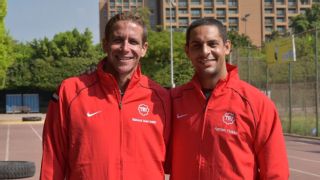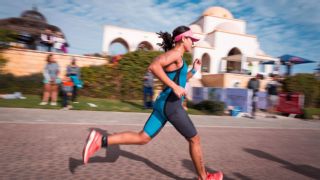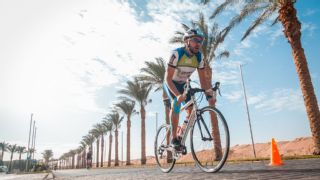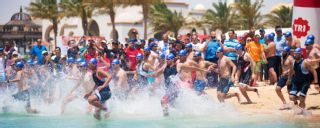|
Training for the grueling Ironman triathlon by swimming, biking and running for miles and miles each day in the blazing heat of congested Cairo is hard enough. Doing it while abstaining from all food and drink from dawn to dusk seems unimaginable. But that's exactly what 25-year-old Aya Hallouda and dozens of other Egyptians put themselves through in June during the holy month of Ramadan, when Muslims are required to fast for 30 days straight. Hallouda was fixated on finishing the 140.6-mile swim-bike-run race in Copenhagen in August fast enough to be the first Egyptian woman to qualify for the Ironman World Championship in Kona, Hawaii, one of the world's most punishing competitions. So on her swimming and cycling days, she was up at 7 a.m., forgoing breakfast and putting in 3,000 to 4,500 meters in an outdoor pool, without her usual juice or Coke on deck. She'd head to her engineering job with an automotive company for the day, with no lunch. Back home, she'd hop on her indoor trainer to pedal for an hour and a half before breaking her fast at 7 p.m. with a peanut butter and jam sandwich and a hibiscus drink, then spin another 90 minutes while fueling with dates and water. She has been accustomed to the dawn-to-dusk fast since age 10. But for training, the key was to do a light workout the first day, ramp it up slowly and refrain from sprints during the month. "My first time I thought it was impossible, too, but then you put yourself in it and you adapt," Hallouda said. "It's like when you do the Ironman the first time. Everyone around you said, 'It's impossible. How will you do it?'" Like many Egyptians, Hallouda had never heard of a triathlon, let alone an Ironman, until a few years ago, when she was invited to join a new group in Cairo training for a triathlon in London. Now there is a surge of interest in the sport in Egypt, part of a broader trend of triathlons kicking into gear across the Middle East. Western expats introduced the sport to the Gulf States more than a decade ago. As the number of Arab athletes steadily grew in places such as Bahrain and Dubai, the biggest organizers of triathlons also were seeing rising numbers of Arabs in their races in Europe. In the past three years, the organizers -- the International Triathlon Union, the sport's global governing body formed in 1989, as well as Ironman and Challenge Family -- all expanded into the region with races in Bahrain and the United Arab Emirates. The ITU, which added a race in Abu Dhabi in March 2015 to open its World Triathlon Series, is now working with U.A.E. officials to train coaches and race officials and to develop athletes who can compete as top-tier professionals or even in the Olympics, said Zita Csovelyak, the ITU's development manager. "The Mideast nations are at the beginning of the triathlon journey," Csovelyak said. "The expats can leave a legacy, but we have to have local roots to have continuity and consistency." The organizers saw an opportunity to grow the sport and extend their seasons with warm-weather races early and late in the year. And the Gulf State monarchies, facing plummeting oil revenues and rising healthcare costs, saw the races as a way to promote healthier lifestyles and sports tourism. Major brands such as Nike are catching on, too, introducing in the spring a mesh "Pro Hijab" head covering that will be available in 2018 for Muslim women athletes. In Egypt, the trend is more homegrown. The country's first private triathlon organizer, The TriFactory, is drawing booming ranks of racers to its Red Sea events -- 150 athletes in its first triathlon in 2014 and 1,000 registered for this month's Sahl Hasheesh Triathlon (Nov. 16-18). It now puts on 11 competitions, including a marathon in Aswan along the Nile in February and an aquathlon (swim-run race) on the North Coast in August. Over the past five years, about a dozen cycling, swimming, running and triathlon clubs have popped up around the country. And entrepreneurs have started a half-dozen businesses catering to the sport, such as Egypt's first indoor cycling center that opened this spring in Cairo's Maadi suburb. TriFactory founder Ayman Hakky is considered by some to be the godfather of those entrepreneurs. He started training Egyptians to be amateur triathletes in late 2012 and quit his business development job at BP in 2015 to build the company full time. "Triathlons in Egypt are like they were in the 1980s and '90s in the United States; everybody is talking about them, everybody is excited," said Hakky, who is 31. Because it's a new sport for the country, it's easy to shine, said TriFactory partner Mahmoud Abdelhakim, a 38-year-old professor of urology at Cairo University who did his first triathlon with Hakky in Dubai in 2013 and finished his third full-Ironman in August. "Everyone is fascinated at what you've done -- and no one knows you suck at it," he said.
 The demographics of Egyptian racers generally mirror those in the West -- mostly middle-class and upper-class professional men and women, and a good number of middle-aged men, who can afford the gear and weekend races and who have latched onto triathlons as their latest challenge in life. A good road bike costs about 20,000 Egyptian pounds, or $1,133, and the average annual income is about 44,000 pounds. And an Ironman weekend race can easily run $1,500, including registration, hotel and flight. And as it did in the United States, the rise of the sport coincided with the emergence of the health food and fitness movements, with dozens of vegetarian restaurants, organic salad bars and yoga studios appearing in Cairo in recent years. What makes this storyline different, besides the training while fasting, is that the sport is flourishing despite substantial native impediments, such as the conflict and terror that racks the region, the negative attitudes toward women training in Lycra and the unbearable heat for several months of the year. Wars continue in Syria, Iraq and Afghanistan, and in Egypt, four terrorist attacks on Coptic churches and pilgrims late last year and this spring left more than 100 people dead. Cairo is one of the last places you'd expect triathlons to flourish. Besides temperatures that routinely spike past 100 degrees in summer, the sprawling city of 20 million is in constant chaos. The roads are choked with beeping vehicles, plumes of exhaust and throngs of darting pedestrians. Sidewalks, when there are any, are obstacle courses of street poles, gaping holes and sudden drop-offs. Public parks are almost nonexistent. Cycling is even more of a challenge, and not just because of the dangerous roads. Egypt's crushing poverty, with a quarter of the population living on about $28 a month, makes buying a road bike out of the question for most and a struggle for those better off who are also suffering under the wheezing economy, weakening currency and rising cost of imports. As for swimming, there are hardly any pools for the public; they're mainly at hotels and in private clubs. And the Nile River is too murky, littered and swift to swim in. One theory of athletes as to why triathlons took hold despite all this, and why it happened only in this decade, has its origin in the Arab Spring uprisings of 2011. The massive street protests that toppled Egypt's dictatorship in the end failed to deliver the economic and political changes that protesters fought for. Some of them turned to exotic sports to exert some independence and let off steam. "We needed distraction at that point to get out of the cycle of disappointment," said Mohamed El Guindy, 39, who owns a utilities tunneling business in Cairo and completed his first full Ironman in Barcelona in September. "Thank god it went to sports. It could have been worse." When Dina Hegazy returned to Egypt in 2011 from the University of Southern California, where she was a Division I swimmer, she sank into the dejected mood of her peers in the wake of the fizzled revolution. "There was so much negative energy it needed to be channeled into something positive in a productive manner," she said. The nightlife scene in Cairo had gone dark as expats and tourists abandoned the country and an ultra-conservative Islamic regime took power in 2012, only to be upended by more protests and a military takeover in 2013. Curfews were imposed, and fewer Egyptians ventured out to clubs and restaurants with their friends. Some of them started to socialize around fitness. And that opened up another door for meet-ups for young adults in Egypt, where most live with their families until they get married. "Boys and girls are flirting -- I'm serious, it started there," said Hegazy, who is 28 and began training with friends for a triathlon in 2014. "It started off as a trend to socialize, and then it ended up being more of like, 'Huh, OK, let's start cycling, let's start swimming, let's form more groups,'" she said. A fourth-grade teacher, she started her own business this year, Swim Zone, coaching adult swimmers, most of them budding triathletes. "It's the best trend that hit Egypt. I can say that," she said. But not everyone subscribes to the notion that the uprisings fueled the sport. "It doesn't actually have anything to do with politics, at least in our team," said Abdelhakim, the partner in TriFactory, which put on Egypt's first private triathlon in 2014. "We never discussed any political interest or thoughts. I think it's just a coincidence." Ahmed Nasser, the head of the government Egyptian Triathlon Federation, which was formed in 2009 and hosted its first race in Suez with 80 athletes in 2010, sees no connection, either. "The thing that's related is people are enthusiastic to have something to do with their lives," he said. "The revolution did not put the incentive in the people for the sport."
 One thing that many triathletes agree on is that much of the boom in interest can be tied to Hakky, the TriFactory founder, and the power of social media. Hakky was working for BP in 2011 in Trinidad and Tobago when his colleagues turned him on to triathlon. When he returned to Egypt later that year he couldn't find any teams to train with. So he posted photos of his Caribbean race on Facebook and asked if anyone was up for a short race in Dubai in early 2013. He awoke to a slew of messages, phone calls and emails. "The amount of interest I got from this post was incredible," Hakky said. He started a sideline company, Train for Aim (the predecessor of TriFactory), and took a team of 10 to the sprint race (750-meter swim, 20k bike and 5k swim). They bragged about their accomplishment on Facebook, and word continued to spread. Soon, the Egyptian Triathlon Federation, which was then organizing pan Arab competitions in Egypt, encouraged the newcomers to form a team and represent the country at an ITU race in London. They took about 40 racers. All the while Hakky was taking note of how the international races were staged -- the sponsorships and volunteers, the medical staff, the medals and T-shirts. Why not put on a race in Egypt, he thought; beginners would be more inclined to try it at home than pay a lot of money to travel abroad. He expected 50 to sign up for the debut in summer 2014 on the Red Sea, but 150 registered. Several months later, Hakky switched Red Sea locations to Sahl Hasheesh, a resort of smoothly paved roads, handsome hotels, swimming pools and palm trees on the east coast of Egypt's mainland, and put on a second race. The resort saw the potential for a tourism boost and helped with the costs, such as a DJ and the welcome-night pasta dinner. About 250 racers turned out. The following year, in December 2015, the number jumped to 400. That's largely because TriFactory and the 2014 finishers posted photos of elated athletes running out of the water and across the finish line, and because Hakky and his team smartly added relays to the weekend event. Members of a team of three could each take a segment of a race -- you didn't need to know how to swim or own a road bike, but you could still be part of the festivities. Friday mornings, once dead quiet as Muslims marked their holy day, were coming alive from Cairo to Alexandria as groups of determined Egyptians took to the streets for rides and runs at 5 or 6 o'clock to beat the heat and traffic.
 Just after sunrise in December 2016, a chilly wind was blowing on the shore of the Red Sea as scores of anxious triathletes stood shivering under an inflated Red Bull arch, psyching up for a sprint into the clear blue water. This was one of the short races of the weekend, the sprint, and groups of friends and relatives were on a jetty in the bay ready to cheer them on. There was something about the crowds there, as well as on the bike route and along the palm tree-lined promenade -- they were all incredibly enthusiastic, hollering, high-fiving and hugging all around. "The mood in Egypt, the ambiance is a completely different stratosphere than the rest of the world, and it's not just because I'm Egyptian," Omar Nour, the country's first professional triathlete, told me as we watched racers sprint to a finish and he cheered on a cousin, "Yala, Hassan!" Nour has raced around the world from Washington, D.C. to Abu Dhabi and was invited to Sahl Hasheesh with other professionals from Europe. "Even they were saying, 'Oh my God, are you guys always like this, this energy, this mood?'" Nour said. "We're big on families in Egypt, so that is a very nice synergy between the sport and the culture." One of the biggest groups turning out for the races that weekend was the Maadi Athletes, supplying 80 of the 800 competitors. The triathlon club was started in 2014, when it spun out of the Maadi Masters swim team. Some of its members, such as club leader Hamdy Yasser, 45, were participating with the whole family. After his first race in 2014, Yasser's wife, Maha, 39; son Karim, 11; and daughter Laila, 15, all followed him into the sport. Among the competitors, there is a bond because many are sharing a new experience. "When you are running and you pass someone, they are encouraging you, pushing you," said Yasser, who finished the 70.3-mile half-Ironman in Dubai this January. "Now we are amateurs, so we are supporting each other. We didn't find this spirit in Dubai." That the Maadi Athletes has grown from 18 racers in the 2014 triathlon to 80 in the December events, and that only a tiny fraction of Egypt's 100 million people has tried the sport, give Mohamed El-Ansary confidence in his gamble. He and his wife, Maha Yacout, opened a cycling center in Maadi in May called PowerRide that has coaches, computerized bikes and rides simulated on a big screen. He quit his sales manager job with a gas company and will coordinate his venture with a pool and a track also being privately developed on the property. "There is not enough demand currently," said Ansary, 32. "But you can see there is great potential." It can't hurt that he and Yacout were among a team of nine Egyptians to complete the full Ironman in Barcelona in September, a first for them all. Nasser, the head of the Egyptian Triathlon Federation and an ITU board member, also has big plans. Nasser, with the backing of President Abdel Fattah el-Sisi and the education and sports ministries, announced in July a major nationwide project to introduce triathlon to students in government schools this year, with gym teachers trained as coaches. The goal is not just to promote the sport, but to lower medical costs for the country, which has spiking obesity rates, and to offer young people alternatives to smoking and drugs and even terrorism, he said. "It's a mega project," Nasser said. "It will be a good development for the whole country."
 Aya Hallouda, who was aiming to qualify for Kona, fell short in the August race in Copenhagen because it was windy on the 112-mile cycle and her legs were dead on the run, she said. She was shooting for under 12 hours but came in at 14 hours and 22 minutes. Typically, women make up about 13 percent of racers in Ironman events in Europe and about 20 percent in the Mideast events. The numbers are higher in the shorter International Triathlon Union races, between 35 percent and 40 percent, according to the organizers. In Egypt, a third of the TriFactory racers are female, Hakky said. Hallouda said she wants to see those percentages rise higher. "There is nothing to stop women from doing this," she said. "Part of it may be about the parents or the environment they live in. By seeing a lot of people participating, maybe they will get the courage to do it as well." Like the majority of female triathletes in Egypt, Hallouda does not wear a hijab while running and cycling. But she lives in a country where many hold conservative attitudes, and where most women outside of the cities wear headscarves and robes, so she trains in long sleeves and leggings in Cairo. Still, she said she hears the occasional misogynist insults on her rides. "Sometime it would be sexual, or whatever, and sometimes it would be like, 'Don't you have a family to raise?'" she said. Among her friends, Hallouda is a superstar because of what she has accomplished. After Hakky asked her to join the team heading to London in 2013 and she nearly quit during the race because the water was so cold -- 52 degrees -- in Hyde Park, she went on to finish three full Ironman races. After her first daylong Ironman -- a 2.4-mile swim followed by a 112-mile cycle and topped with a marathon -- in Malaysia in 2015, beginner and aspiring triathletes, both women and men, were inspired to push themselves, too, Hallouda said. "There was a guy who came and told me, 'You know why I'm participating? You're a woman and you went there and you did it, so why can't I do it?'" she recalled. "I'm not only encouraging the girls, but the weak guys who hesitate." She's still chasing her goal. She plans to do the half Ironman in Dubai and the full 140.6-mile race in Frankfurt next year. She's working on interval training. She's confident she can knock an hour or so off her personal best of 13 hours and 14 minutes in Barcelona in 2016. Longer term, she has another aim. "One of my main dreams is to see people cycling everywhere in the streets," Hallouda said. "The difference between the last two years is enormous. The sports vibe is growing exponentially in Egypt, and this is amazing."
|

